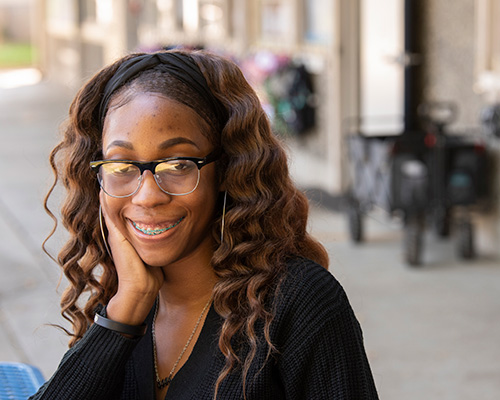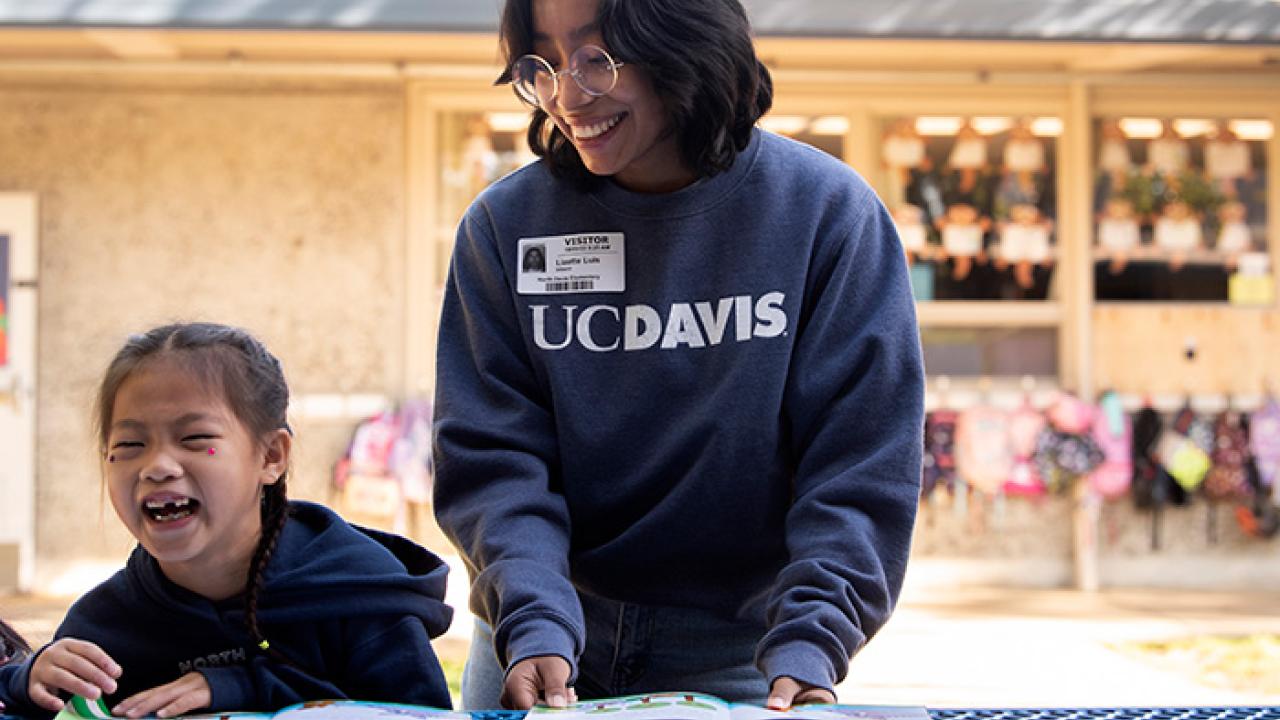In a classroom two miles from UC Davis, a second-grade student doubted her ability to work with numbers and approached Lizette Luis for help. After they puzzled through a math problem together, the girl was encouraged by what she learned.
For Luis, a UC Davis senior, and the students she started working with at North Davis Elementary School in September, her internship was off to a good start. “On my first day, I already saw an impact,” she said.
The transfer student is among more than 300 students from four area colleges and universities learning and earning as they help make a difference in their communities through the Sacramento Valley consortium of the new #CaliforniansForAll College Corps.
UC Davis leads regional College Corps program
In the fall, the statewide College Corps program launched more than 3,200 student fellows from 45 colleges and universities into paid service opportunities with community organizations focused on K-12 education, climate action and food insecurity.
UC Davis leads the Sacramento Valley College Corps, or SVCC — also including Sacramento State, Sacramento City College and Woodland Community College. The SVCC will receive up to $16.1 million over two years to recruit, train, place and pay about 1,000 fellows.
At UC Davis, the College Corps program bolsters the Aggie Launch initiative, a flagship program of the university’s ongoing fundraising campaign, to make experiential learning accessible to all students as part of career exploration and preparation.
About 180 fellows from UC Davis are serving with about 60 organizations in the region, from the Yolo Food Bank to Tree Davis and some campus organizations such as the Aggie Compass Basic Needs Center. About 40 are in 10 schools of the Davis Joint Unified School District.
In a complementary course, the students reflect on their experiences and hear from guest speakers to learn to address common challenges in community-based organizations and develop professional skills.
Pablo Reguerín, vice chancellor of Student Affairs, is principal investigator for SVCC, and the Internship and Career Center and Public Scholarship and Engagement are leading the program’s development.
Students are paid for internship
Fellows, who serve about 15 hours a week, or 450 hours over the year, receive a $700 stipend in each of the 10 months of the academic year and, on completion, a $3,000 education award.
Luis, a sociology major with a minor in education, said she applied for the program to further explore her passion for teaching. “I felt it was going to give me a push in the direction I wanted to go,” she said, adding that the monthly stipend is helping pay her rent.
At North Davis Elementary three days a week, Luis is in second- and fifth-grade classrooms leading small group work and providing one-on-one support in English and math, and on the playground supervising activities for inclusion, fun and safety. Recently, she helped four students read aloud a retelling of a Brothers Grimm fairy tale.
“I love interacting with the kids,” she added. “I go to the school and say, ‘This is it!’”

Developing important skills
Marrisa Smith, majoring in African American and African studies, is also a fellow at the school. Looking toward a career in real estate, she said the experience is helping her develop some important skills.
“Just getting up in the morning, balancing my responsibilities and remaining committed is good,” said the fourth-year student from Carson, California. “It’s also teaching me to be adaptable, especially working with children.”
Undocumented students eligible
Rody Boonchouy, assistant superintendent of instructional services for the Davis school district, is enthusiastic about the program. “The College Corps has really brought in a diverse group of students,” he said. “It’s really inspiring for our district.”
Lynn Fowler, director of the SVCC, said one of the program’s goals is to break down the barriers that can prevent low-income and undocumented students from participating in paid field placements and community-based internships.
In keeping with its own “We All Belong” resolution, the district arranged to accommodate students without government documentation by accepting SVCC letters introducing the fellows.
Boonchouy said the district has long welcomed UC Davis students to serve internships or get teaching experience.
Teachers in a new part-time administrative role at each elementary school serve as a point person for the fellows and the university. Boonchouy said the assignment of the fellows for a full academic year offers continuity for his students and promises a good return on the district’s investment of time in the fellows.
And in a teacher shortage, Boonchouy is not missing the long game. “We also see this as an opportunity to recruit students into the teaching ranks.”
